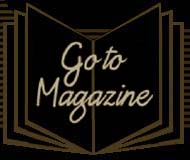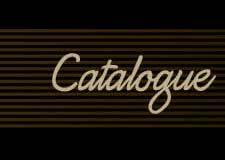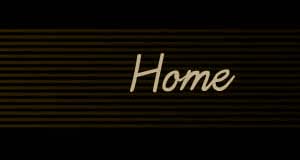
|
 The Dark Crusade The Dark Crusade
 (From the book "Heroes &
Villains") (From the book "Heroes &
Villains")
 By : Deborah Susan Jones : Editor By : Deborah Susan Jones : Editor
 Originally created for
the 1991 Lone Wolf roleplay paperback game book "The
Darke Crusade" the title was always known to the Artist
as "The Dark Crusade" (without the "e") because the
written brief for the job from the publisher offered no
indication to the contrary. The Lone Wolf paintings for
the Red Fox editions in the UK were always, from the
start, the subject of close involvement between Artist,
Author and Art Director, but as these were new books,
and not reprints, paintings were a very dynamic
production process that was very much a creative melting
pot of intense cooperation. It was a very exciting time
and as with any intense creative experience, it is often
only with hindsight that a real overview, and indeed
review, occurs. Originally created for
the 1991 Lone Wolf roleplay paperback game book "The
Darke Crusade" the title was always known to the Artist
as "The Dark Crusade" (without the "e") because the
written brief for the job from the publisher offered no
indication to the contrary. The Lone Wolf paintings for
the Red Fox editions in the UK were always, from the
start, the subject of close involvement between Artist,
Author and Art Director, but as these were new books,
and not reprints, paintings were a very dynamic
production process that was very much a creative melting
pot of intense cooperation. It was a very exciting time
and as with any intense creative experience, it is often
only with hindsight that a real overview, and indeed
review, occurs. 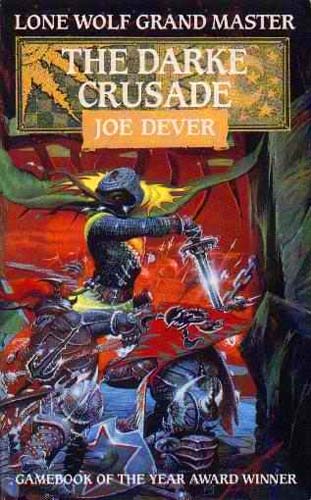 This melting pot of
creative idea-swapping provided exciting material to
visualise a cover painting and later, when the book was
published, the final book cohesion, of text and image,
materialised. This melting pot of
creative idea-swapping provided exciting material to
visualise a cover painting and later, when the book was
published, the final book cohesion, of text and image,
materialised.
 "A devastating attack by the Darklords has
destroyed the monastery where you were learning the
skills of the Kai Lords. You are the sole survivor.
Revenge seems appropriate. To start, you must reach
Holmgard to warn its King of a gathering evil. Servants
of darkness aim to track and hunt you over the country
presenting many challenges. King Sarnac of Lencia seeks
Lone Wolf's help to battle the Drakkarim under control
of Magnaarn, High Warlord of Darke and the Lencians have
discovered Magnaarn seeks the Doomstone of Darke and
fear he is close to discovering this artifact and its
power to conjure evil Nadziaranim sorcerers and many
other Darklord allies against Lencia . . . . . . . "A devastating attack by the Darklords has
destroyed the monastery where you were learning the
skills of the Kai Lords. You are the sole survivor.
Revenge seems appropriate. To start, you must reach
Holmgard to warn its King of a gathering evil. Servants
of darkness aim to track and hunt you over the country
presenting many challenges. King Sarnac of Lencia seeks
Lone Wolf's help to battle the Drakkarim under control
of Magnaarn, High Warlord of Darke and the Lencians have
discovered Magnaarn seeks the Doomstone of Darke and
fear he is close to discovering this artifact and its
power to conjure evil Nadziaranim sorcerers and many
other Darklord allies against Lencia . . . . . . .
 Created in two stages, one
being the background which was shot onto transparency, the
second then being an over-paint of the figures, the
overall piece was delivered to Red Fox for the paperback
cover while the background appears as an endpaper in the
artist's roleplay games art book "HEROES & VILLAINS"
along with the full version. This was a technique the
Artist used on many occasions in the paperback market in
the 80's derived from film and television techniques he
developed in a variation of the multi-plane camera
technique, which was evolving into C.S.O. (colour
separated overlay) which used different layers of artwork
synchronised via several tv cameras. Eventually, this
developed into the current digital effects industry and
indeed digital painting is a technique the Artist now
often employs but not to produce digital art, instead,
digital work is sometimes used as "underpainting" or for
generating non-organic imagery and effects which are later
modified and enhanced organically, often with a specially
formulated oil paint that is manufactured in the Artist's
studio specially for the task. Created in two stages, one
being the background which was shot onto transparency, the
second then being an over-paint of the figures, the
overall piece was delivered to Red Fox for the paperback
cover while the background appears as an endpaper in the
artist's roleplay games art book "HEROES & VILLAINS"
along with the full version. This was a technique the
Artist used on many occasions in the paperback market in
the 80's derived from film and television techniques he
developed in a variation of the multi-plane camera
technique, which was evolving into C.S.O. (colour
separated overlay) which used different layers of artwork
synchronised via several tv cameras. Eventually, this
developed into the current digital effects industry and
indeed digital painting is a technique the Artist now
often employs but not to produce digital art, instead,
digital work is sometimes used as "underpainting" or for
generating non-organic imagery and effects which are later
modified and enhanced organically, often with a specially
formulated oil paint that is manufactured in the Artist's
studio specially for the task.
 "I have never really
understood, myself, whether I am a purist, a "painter in
oils", which certainly forms the backbone of my skills,
or, then again, I could as easily say "I am a mixed-media
Artist" because I have used so many other types of paint,
including "digital paint" to extend, modify, over-paint,
underpaint and extensively vary my basic "oil painting
technique". "I have never really
understood, myself, whether I am a purist, a "painter in
oils", which certainly forms the backbone of my skills,
or, then again, I could as easily say "I am a mixed-media
Artist" because I have used so many other types of paint,
including "digital paint" to extend, modify, over-paint,
underpaint and extensively vary my basic "oil painting
technique".
 "I guess it comes down to a
fundamental belief that on the one hand what you paint it
in is irrelevant, it's the image, the idea, that counts
most, but tempered by the fact that all art, even "fine
art", is traded in, and made for, even if unconsciously,
or unknowingly, a marketplace, and each market has a
certain expectation of how the art should be made, stated
as being made, and indeed, presented. "I guess it comes down to a
fundamental belief that on the one hand what you paint it
in is irrelevant, it's the image, the idea, that counts
most, but tempered by the fact that all art, even "fine
art", is traded in, and made for, even if unconsciously,
or unknowingly, a marketplace, and each market has a
certain expectation of how the art should be made, stated
as being made, and indeed, presented.
 "If that sounds like a bit of a
contradiction, then consider that, if one has worked in so
many markets over the years, film, tv, publishing,
advertising, gallerys, private commissions, then to have
done so implies a certain willingness, necessity even, to
be flexible in approach in order to gain the opportunity
to do. "If that sounds like a bit of a
contradiction, then consider that, if one has worked in so
many markets over the years, film, tv, publishing,
advertising, gallerys, private commissions, then to have
done so implies a certain willingness, necessity even, to
be flexible in approach in order to gain the opportunity
to do.
 "The challenge then becomes,
when one goes "self-published" in that "there are no maps,
there are no pathways, on the road to uncharted goals"
which on the one hand implies, at least in principle,
"unlimited artistic freedom" while on the other,
self-imposed disciplines, including technical ones, or
else one may find oneself lost on an uncharted creative
sea where the coastline of artistic completion is no
longer visible. "The challenge then becomes,
when one goes "self-published" in that "there are no maps,
there are no pathways, on the road to uncharted goals"
which on the one hand implies, at least in principle,
"unlimited artistic freedom" while on the other,
self-imposed disciplines, including technical ones, or
else one may find oneself lost on an uncharted creative
sea where the coastline of artistic completion is no
longer visible.
 "To me, it is like being a
teenager, before art school, sitting cross legged on my
bedroom floor painting flower power posters in cheap
poster paints for fun while simultaneously approaching
death with "all that I know about paint" piled up in the
infinite art supply shop of the mind. "To me, it is like being a
teenager, before art school, sitting cross legged on my
bedroom floor painting flower power posters in cheap
poster paints for fun while simultaneously approaching
death with "all that I know about paint" piled up in the
infinite art supply shop of the mind.
 "The challenge, of balancing my
basic creative, spontaneous drive, against accumulated
skills to choose from is not one you get time to consider
when crashing deadlines for clients. When one becomes the
client, then "considerations" enter the process, and so
does contemplation. "The challenge, of balancing my
basic creative, spontaneous drive, against accumulated
skills to choose from is not one you get time to consider
when crashing deadlines for clients. When one becomes the
client, then "considerations" enter the process, and so
does contemplation.
 "There's considerably more to
"self-publishing" than painting a picture and just
printing it out . . . . . . . . . !" "There's considerably more to
"self-publishing" than painting a picture and just
printing it out . . . . . . . . . !"
 Deborah Susan Jones Deborah Susan Jones
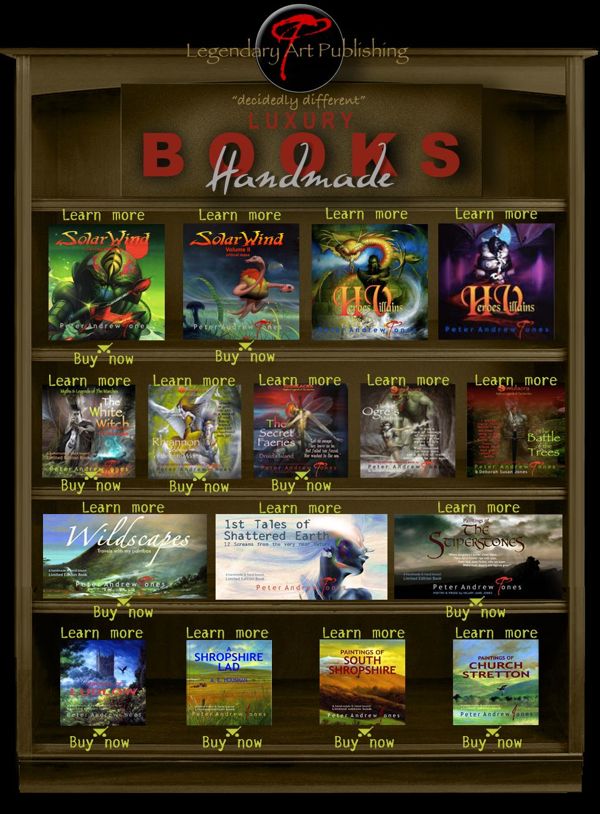
|
 |


 This melting pot of
creative idea-swapping provided exciting material to
visualise a cover painting and later, when the book was
published, the final book cohesion, of text and image,
materialised.
This melting pot of
creative idea-swapping provided exciting material to
visualise a cover painting and later, when the book was
published, the final book cohesion, of text and image,
materialised.
